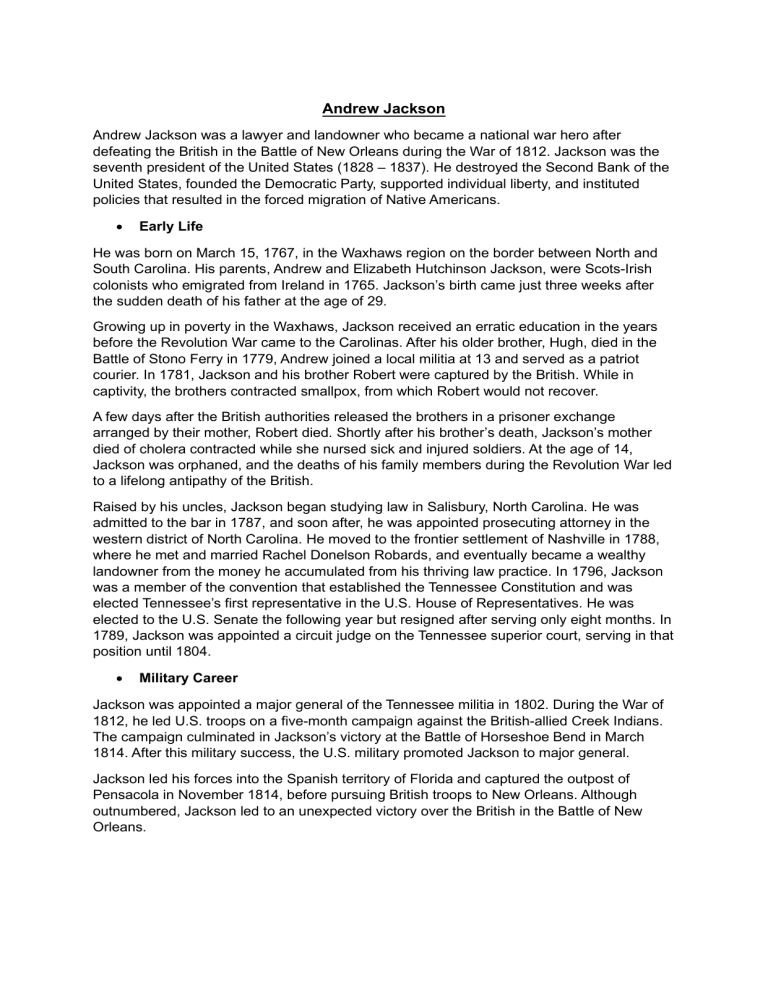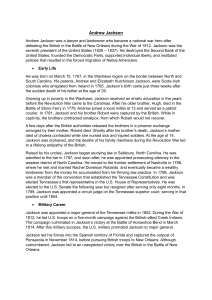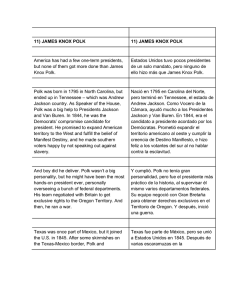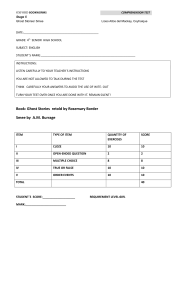
Andrew Jackson Andrew Jackson was a lawyer and landowner who became a national war hero after defeating the British in the Battle of New Orleans during the War of 1812. Jackson was the seventh president of the United States (1828 – 1837). He destroyed the Second Bank of the United States, founded the Democratic Party, supported individual liberty, and instituted policies that resulted in the forced migration of Native Americans. • Early Life He was born on March 15, 1767, in the Waxhaws region on the border between North and South Carolina. His parents, Andrew and Elizabeth Hutchinson Jackson, were Scots-Irish colonists who emigrated from Ireland in 1765. Jackson’s birth came just three weeks after the sudden death of his father at the age of 29. Growing up in poverty in the Waxhaws, Jackson received an erratic education in the years before the Revolution War came to the Carolinas. After his older brother, Hugh, died in the Battle of Stono Ferry in 1779, Andrew joined a local militia at 13 and served as a patriot courier. In 1781, Jackson and his brother Robert were captured by the British. While in captivity, the brothers contracted smallpox, from which Robert would not recover. A few days after the British authorities released the brothers in a prisoner exchange arranged by their mother, Robert died. Shortly after his brother’s death, Jackson’s mother died of cholera contracted while she nursed sick and injured soldiers. At the age of 14, Jackson was orphaned, and the deaths of his family members during the Revolution War led to a lifelong antipathy of the British. Raised by his uncles, Jackson began studying law in Salisbury, North Carolina. He was admitted to the bar in 1787, and soon after, he was appointed prosecuting attorney in the western district of North Carolina. He moved to the frontier settlement of Nashville in 1788, where he met and married Rachel Donelson Robards, and eventually became a wealthy landowner from the money he accumulated from his thriving law practice. In 1796, Jackson was a member of the convention that established the Tennessee Constitution and was elected Tennessee’s first representative in the U.S. House of Representatives. He was elected to the U.S. Senate the following year but resigned after serving only eight months. In 1789, Jackson was appointed a circuit judge on the Tennessee superior court, serving in that position until 1804. • Military Career Jackson was appointed a major general of the Tennessee militia in 1802. During the War of 1812, he led U.S. troops on a five-month campaign against the British-allied Creek Indians. The campaign culminated in Jackson’s victory at the Battle of Horseshoe Bend in March 1814. After this military success, the U.S. military promoted Jackson to major general. Jackson led his forces into the Spanish territory of Florida and captured the outpost of Pensacola in November 1814, before pursuing British troops to New Orleans. Although outnumbered, Jackson led to an unexpected victory over the British in the Battle of New Orleans. • Running for President Jackson’s military triumphs made him a rising political star, and in 1822 the Tennessee Legislature nominated him for the presidency of the United States. To boost his credentials, Jackson ran for and won the election to the U.S. Senate the following year. In 1824, state factions rallied around Andrew Jackson, and a Pennsylvania convention nominated him for the U.S. presidency. Although Jackson won the popular vote, no candidate gained a majority of the Electoral College vote, which threw the election to the House of Representatives. Speaker of the House Henry Clay pledged his support to Jackson’s primary opponent, John Quincy Adams, who emerged victorious. After a bruising campaign, Jackson won the presidential election of 1828. With his election, Jackson became the first frontier president and the first chief executive who resided outside of either Massachusetts or Virginia.









